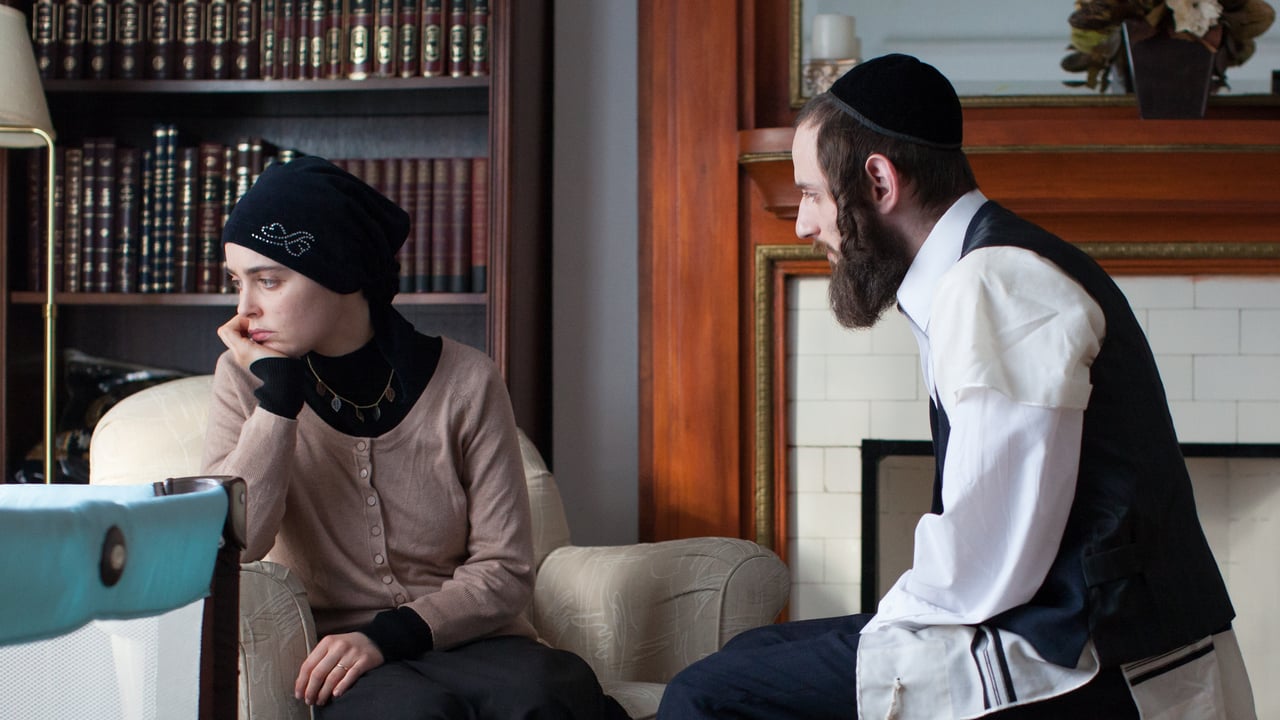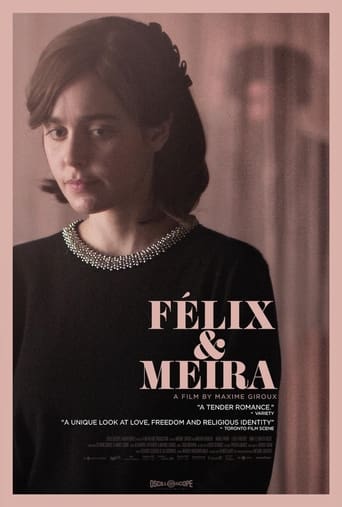

Looking at Felix and Meira, you can definitely see why many moviegoers might walk away unimpressed by it. Many of them will miss what it's about, or why it exists. It is an understated film, but it says something, albeit softly. It's not exactly Romeo and Juliet, not exactly Clash of Civilizations. It's Felix and Meira.The film tells the story of two people in Montreal, who inhabit the same neighbourhood but live in foreign worlds. That might not seem too novel a concept, but there are interesting specifics, as the secular Felix gets to know Meira, a Hassidic Jew- she can't look him in the eyes, can't choose to have only one child in her marriage. It's not an indictment of Judaism or even religion entirely- it's just about a woman who is unhappy with her life, and her liberation. Whether going into another relationship is the answer is another question. I'm not entirely sure what Felix and Meira saw in each other, except for intriguing differences in lifestyle. But it is an interesting parallel how we see at the end that Felix was also bullied to fit into his family, and interesting that Meira's husband sees how this is the case. I'm not entirely sure what decade this film is supposed to take place in. It's sort of timeless, and while belonging to Montreal, may speak to anyone.
... View MoreFelix and Meria begins with a traditional Hasidic Jewish dinner: singing, celebration and religious clothing. Everyone seems comfortable except for Meria, our protagonist, and immediately through visuals we sense that something does not sit well with her. Thus begins the major conflict of the film as Meria debates internally her commitment to tradition.Because of the timeless nature of this culture, at the beginning it is deliberately unclear what time period the film takes place in. Meria is scolded by her extremely traditional husband for playing LP records, indicating the film is a period piece. Yet as the film goes on and Meria slowly ventures outside of her Hasidic bubble, we realize that the film does in fact take place in present day, yet we discover it through her eyes and slowly it becomes more modern. The visual palette (like a love child of last year's Ida and A Most Violent Year) distinctly drives Meria's journey. This makes the modern world look in a distinct way unlike anything I have ever seen in a movie.While focusing on Meria and her doubts in her beliefs, it quick develops into a love story. Despite being married and living among the traditional culture, Meria falls for Felix, a bachelor without the same family values. This isn't the adulterous kind of romance - everything is subdued, making even holding hands feel like a display of passion. The suspense remains because of how forbidden the relationship is in the first place, and thanks to top-tier performances and direction, the relationship between protagonists never feels inauthentic.The dramatic sequences scattered throughout the film significantly outweigh the overall narrative. The symbols are rich without being overt. As said above, this is a movie full of subtlety that matches the emotional tone of the characters. The only not subtle moment happens right after Felix and Meria first spend time together, when the film transitions to an isolated clip seemingly unrelated yet emotionally moving. I would have been happy to see more of these, but alas because it only happened once it draws more power to itself.As stated above the primary conflict of the film is tradition vs. love, which is incredibly powerful yet not as universal in today's world. Unfortunately, Meria's husband is reduced to being a caricature and not given enough complexity as a character. Had he been more layered, it would increase the stakes in how difficult it would be for Meria to decide to stray away from him. Regardless, this is the romantic drama that people should yearn for. Most romance audience prefer the more saccharine Nicholas Sparks adaptations, but could truly enjoy seeing something much more subtle and powerful as seen in Felix and Meria.
... View MoreThis film is about the explicit values of two adjacent cultures who live on different sides of a railroad, each reaching for something more the unknown. For Felix and Meira, the unknown becomes uncertainty. Life and lifestyles are disrupted, communities clash, and traditions unsaddled. This isn't a story of skinheads, hippies, Trekkies, or of Generations X, Y, or Zeds. It is of a girl called Meira and French Felix, each who adopt their known cultural traits. Her identity is repressed, arrested by secret Hasidic customs and protocol where women are quieted and obedient. Apparently of the Satmar tribe, women wear wigs and are in arranged marriages. Felix flits in and out of his family, daring to explore the matrix of love. Meira too openly resists the known in favour of love, romantic love. However, romantic love is not reality. Viewers experience subconscious moments acknowledging resistance to our ostensibly defined lives. Each of us wanting to explore outside known cultural norms. Some may call it slow moving, I call it pace. We aren't rushed through every scene, but given permission to decode the mysteries of the Hasidim. What is uncovered, I cannot tell. What is revealed, is how the unknown can be even more uncertain than what we know.
... View MoreI was completely blown away by this unique film. It is a gentle, nuanced look at two people from very different communities who connect and fall in love. The young woman is from the Hassidic community in Montreal. She is questioning her life and the limitations imposed on her by her community. The man she meets is not from her community and at a crossroads in his life. While this premise might seem implausible, it is explored with subtlety and respect. I cannot forget to praise the terrific performances of the three main actors. Israeli actress Hadas Yaron is simply amazing as Meria, the young Hassidic woman who is stifling in her marriage and community. Martin Dubreuil is also very good as Felix who is in search of something but is not quite sure what. All he knows is that he is instantly attracted to the shy, reluctant young woman and he must try to connect with her in any way he can. The chemistry between the two is simply electric. The character of Meira's husband could have easily been portrayed as the clichéd overbearing, uncaring spouse. Instead, actor Luzer Twersky makes him a sympathetic character trapped by his own failings. He simply does not know how to deal with his wife's angst. There are some incredible moments of tenderness in this film (The first time Felix and Meira hold hands is understated but very powerful). Overall this is a beautiful layered love story that is full of hope and happiness. Love will always find a way. Not to be missed. Bravo Maxime Giroux for giving us such a beautiful film.
... View More